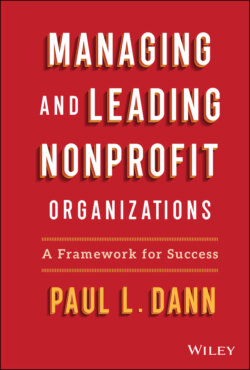Читать книгу Managing and Leading Nonprofit Organizations - Paul L. Dann - Страница 19
Find a Mentor
ОглавлениеEarly on in my career I quickly realized that there was much to learn from more senior leaders within my nonprofit organization. Some of this learning came naturally by observing their approach and style to any number of situations. I learned from their example both what to do and, at times, what not to do. Often my direct supervisor served as a source of leadership development, particularly when I had a supervisor who had leadership strengths. This was ideal because meetings were regularly scheduled and included discussions about various situations that had arisen between meeting times. There were times, though, when my direct supervisor was not someone I felt I could learn from. In these instances, I felt their skills as a leader were lacking. These were the instances where I would typically learn what not to do. A reverse role model, if you will.
When I found myself in this predicament, I realized that I would have to seek support for my developmental leadership journey from someone other than my direct supervisor. It was not too difficult to look around the organization or even outside of the agency to find someone with the skills and expertise in leadership that I could respect. The key was to be intentional about this effort to pursue a mentor who could support my development. There is always a risk that you could become complacent by resigning yourself to the fact that you have a difficult situation with a supervisor, and rather than pursue an external mentor and coach, settle into feeling stuck. Better to be intentional and avoid the cul‐de‐sac of complacency as you work to develop your leadership capability.
I have heard and experienced the idea as well that mentees choose their mentor. If you are to have a mentor, and you should, set about intentionally developing a professional relationship with a colleague or associate whom you respect. In time this respect can form the foundation for building a relationship of trust, support, and learning that in the best of worlds will become reciprocal over time.
The positive impact associated with a true mentor relationship is well documented. Ayoobzadeh and Boies (2020), for example, researched the impact of mentors and found that successful mentor relationships helped to increase positive outcomes for the participants. Now notice that the key term here is successful mentor relationship. It is not enough to simply participate in a structured mentor program within your organization and assume that the mentor/mentee relationship will be defined as successful. There are many variables that come into play when we pursue a successful mentor relationship—not the least of which revolves around the way in which the organization's culture supports the development of mentorships (Johnson & Smith, 2019).
Considerations include whether there is mutually shared respect between the mentor and the mentee. The mentor must be perceived by the mentee as having the skills necessary to play the role in a positive way and even beyond that it is critical that the mentor have the skill set necessary to fulfill the role of mentor. And even if these pieces are in place it's essential that the mentor and the mentee have a willingness to develop and sustain a supportive relationship All these variables and more are at play in the development of a successful mentor relationship.
It might be that your pursuit of a mentor will move you beyond the single mentor/mentee relationship to consider having multiple mentor relationships, where you can draw support and guidance from several individuals in your network of relationships. No matter the form, be sure to develop a mentor/mentee relationship. Be intentional in this area as the rewards for your leadership development will be significant.
